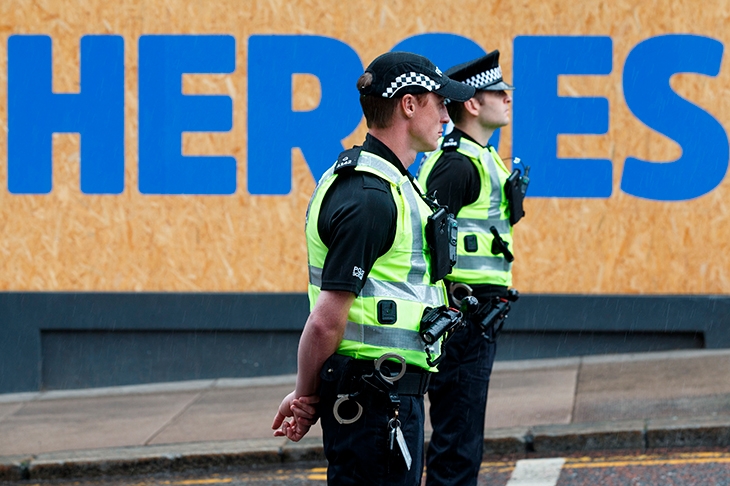Deterring crime
Sir: Rod Liddle is right to highlight the politicisation of the police as a source of their inadequacies, but I think he misses the crucial point (‘Defund the police’, 27 June). We simply do not have bobbies on the beat to even feel sympathy for, and this means that constructive relationships between a recognisable police officer and their community are a rarity. As Kevin Hurley describes, many black youths in our cities have nothing but hatred towards police officers, and this cannot be a surprise when the only interactions they have with them are being forced to empty their pockets after being suspected of criminal activity.
Mr Liddle may bemoan the inability of the police to solve burglaries or robberies, but by this point the police have failed in their original purpose of deterring crime. A clear tactical shift to prioritise deterring rather than responding to crime is far more important than the issue of politicisation.
Luke Butterworth
Croydon, London
Sacred spaces
Sir: As someone who has been reluctant to accept the adage that ‘perception is all’, I might almost be persuaded otherwise by the exchange between four Anglican bishops (Letters, 27 June) and Douglas Murray. Of course the bishops point to the online activity offered, but they need to be careful about equating log-ons and participation. And what of the 5,000 or so parishes that have not offered ‘online worship’?
What Douglas Murray addressed in his piece is, however, something else entirely: the message conveyed by locked doors and laminated closure signs, and the silence of the church leadership on the broader stage unless it was to echo government health warnings, to berate Dominic Cummings or dilate on statuary.
One of the signatories of the bishops’ letter wrote a much-admired doctoral thesis on the theology of place. It is clearly a subject of interest to the episcopacy because another member of the House of Bishops has also edited a book on the subject. Sacred space — and sacred places — in England are to a significant extent synonymous with church buildings, many of which have been open for hundreds and hundreds of years. This is inherently understood even by people who seldom darken church doorways. Closing them — and closing all of them — sends out a powerful message which no amount of online activity could possibly counteract.
Stephen Wikner
Pinner, Middlesex
Restore Ronald Fisher
Sir: As an alumnus of Gonville and Caius College, I agree with Professor David Abulafia that Joseph Needham’s portrait should not ‘fall’ (‘Empire states of mind’, June 27). I find it ironic that the college has this week decided to remove the small window dedicated to Ronald Fisher on the grounds of his views on eugenics. While Needham supported Chinese communism even as tens of millions were murdered, Fisher — among his other achievements — played a key role in the development of randomised controlled trials which, in their application over the years, must have saved at least as many millions of lives if not far more. Such are the hypocrisies of our age.
Chris Carter
London EC2
Nice yobs
Sir: Imagine my surprise to find an article by Cass Pennant in The Spectator (‘Why “football thugs” want to defend statues’, 20 June). Many years ago, I defended Cass (unsuccessfully) when he was charged with actual bodily harm on another fan. I always thought that Cass was innocent, but that the authorities wanted to make an example of the Inter City Firm (ICF). I called a number of defence witnesses, all of them members of the ICF, and was struck by how nice most of them were. I recall one saying to me that he thought I had a pretty good life but that he was ‘just a football yob’. I felt that, in different circumstances, our roles might easily have been reversed.
David Houston
London W4
Pond life
Sir: Tristram Hunt’s item on the loss of freedom at the Hampstead Ponds (Diary, 27 June) is a reminder that they are a colourful representative microcosm of London life. Can the same be said of the City of London Corporation, which puts banqueting — as a charitable objective — above physical, mental and emotional wellbeing, and the 149 years of unenclosed dipping there by ordinary citizens? Both Lord Byron (a swimmer of course) and John Wilkes would, were they still with us, be among protestors against this contemporary enclosure of public land and the loss of personal freedom.
Robert Sutherland Smith
Chairman, United Swimmers Association of Hampstead Heath, London N2
Religion and refugees
Sir: Michael Nazir-Ali’s piece on foreign aid (‘Aid and abet’, 27 June) includes a common misrepresentation of UN work supporting refugees in the Middle East. He states: ‘Christian refugees from Iraq and Syria are generally absent from UN-run camps in Jordan, Lebanon and Turkey because these can be controlled by Islamists who insist on compliance with Sharia to gain admission.’
Only about 8 per cent of refugees in the Middle East reside in camps. In Turkey, camps are government-run and host a very small portion of the refugee population. UNHCR runs two refugee camps in Jordan and co-ordinates some camps in Iraq. Security is the responsibility of the state. Most Syrian and Iraqi Christian refugees are in Lebanon, where no camps exist. UNHCR adheres strictly to humanitarian principles, and action and service provision is carried out based on need alone. Funding invariably falls well short of the huge needs, and goes to the most vulnerable, whatever their religion. UNHCR does work with refugees and IDPs to address issues of tolerance, and we work hard to address concerns of Christian and minority refugees with a range of faith-based organisations.
Rossella Pagliuchi-Lor
Representative, UNHCR UK, London EC4






Comments